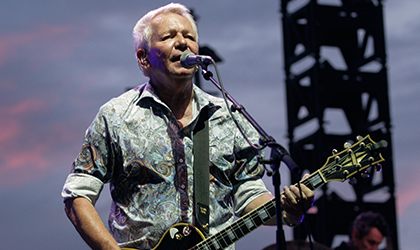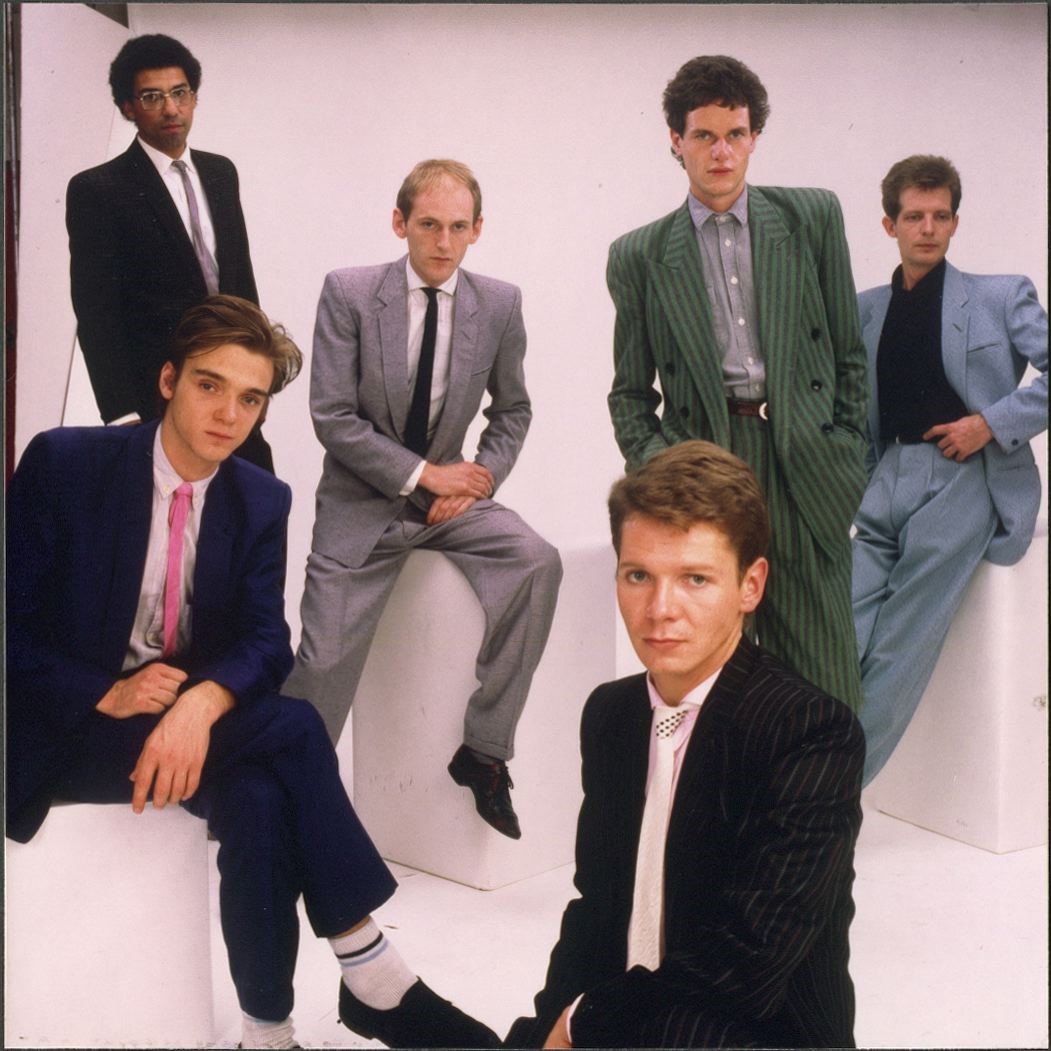Great Southern Land
For over four decades, the songs of Aussie rock band Icehouse have won them a legion of devoted fans. But there’s one song in particular that’s captured the heart of the nation.
This month, the legendary band hits the Darwin Amphitheatre for one huge show as part of their national Great Southern Land Tour, supported by Emily Wurramara, William Barton, Eskimo Joe and Missy Higgins. Tierney Seccull caught up with lead singer Iva Davies for chat.
‘Great Southern Land’ has been coined by many as Australia’s unofficial national anthem, and it celebrates 40 years this year. 40 years!
[laughs] It’s frightening, isn’t it?
It’s impressive! What do you think it is about this song that’s got such a grip on us?

Look, I wish I had the answer to that! I’d like to be able to bottle that [laughs]. But, look, I really don’t know. The perspective I have on it is so, kind of pedestrian and unremarkable – I’d need to really give you context to explain that.
The context is that the original band was called Flowers, and our first album was called Icehouse, which was only released in Australia and New Zealand because we only had a local record contract. The success of [the album] had generated a lot of interest from overseas, so we were signed to a label, but when they did a check, they said we couldn’t use the name Flowers which was when the band became Icehouse.
Then, of course, the mission was to go off and conquer the world. So we went on our first international tour and I had to give up my flat that I’d been in for five-and-a-half years – which was kind of the icehouse, as it was a freezing cold flat – because I was going to be away for six months.
At the beginning of that tour, the flight out of Australia took us right across Australia, and that was sort of a light bulb moment because I went to sleep over the desert and woke up two hours later, over the desert. And my head exploded in terms of the sheer scale of the place.
On that tour, we worked incredibly hard and I got incredibly homesick. I did a lot of thinking about coming home, and when I came back, there was this sort of panic-driven situation that I found myself in – those first songs on the album had been accumulated over three years, but now I only had a couple of months to write the second album. Not only that, I was homeless at the time, so I was couch surfing with a cassette player, basically.
I spent time house minding Rick Brewster’s house, the lead guitarist from The Angels, and wrote various bits and pieces. When I finally got my own place to live, the first song that I wrote was ‘Great Southern Land’. By then, I was in such a panic about filling the quota of 10 songs, that instead of waiting until I had all of them, I took that song into our managers, just to show them that I’d actually made a start, you know [laughs]. “Here you go – here’s one of 10 – I’m getting there, I’m getting there!”

They reacted straight away, but I was so preoccupied, that I didn’t really register their reaction. They rang me up and said they’d taken the song to the record company, and they’d reacted the same way. And so, I didn’t really register the way people were reacting to it because I was desperately trying to carry on work in this kind of small window of time that I had [laughs].
All of this kind of came as a complete surprise to me, I guess. If someone had have whispered in my ear back then that we’d be talking about this song in 40 years’ time, I would just simply wouldn’t have believed that would be possible!
That’s pretty cool – that you wrote this anthem, as we’ve come to know it, and you just didn’t realise how good it was?
[laughs] Thank you!
I mean, the fact that we’re talking about it now, and I’m asking you to rehash these memories 40 years later, must be such a bizarre but cool experience for you?
You know, along the way it had a very – what’s the word – difficult birth? Because from my point of view, I had an 8-track tape recorder that I’d just bought, and I’d had a brand-new toy to play with – this thing called a LinnDrum – which decades later, turned out to be once of the most revered drum machines ever made.
The first thing I produced on it when I was learning how to program it was the drum pattern of ‘Great Southern Land’. The irony of that is the tempo of ‘Great Southern Land’ is 120 BPM, which is a very standard kind of disco tempo. But the reason why ‘Great Southern Land’ is 120 BPM is that I was learning how to program my own patterns into arrangements, but I hadn’t learned how to speed up or slow down the machine yet [laughs].
So, ‘Great Southern Land’ is actually the default tempo of the LinnDrum – you can kind of see how weirdly organic all of this stuff was, you know, flying by the seat of my pants but operating on complete instinct!
That is excellent. That is very wholesome – a beautiful thing to happen quite accidentally.
Indeed! And when we did record it – again – we presented it to the record company and they were very concerned, because a perfect radio length of a song was around three minutes and 30 seconds long. I remember them, on many occasions, saying to me, “we cannot have a four!” Even three minutes and 59 seconds was far, far better, because the radio programmers would take one look at it, if they saw a four, they’d say, “nup, we’re not gonna play it.”
‘Great Southern Land’ was five minutes and 15 second long. [Laughs]. And it starts with one really, really, really long-held synthesiser note, and that was quite deliberate because I wanted to paint a sonic picture of a horizon that just seemed to go forever, because that was my experience … I remember Martin Fabinyi from Regular Records kind of sheepishly said to me, “do you think we can edit that note off the front, ‘cause it’s really long and nothing happens?” And I said, “no, no, no, I put that there deliberately!” So, they didn’t edit it off and it remains today with that really long note.
In the last couple of years, we did a really big show, and when we came off stage and our keyboard player said to me, “you know, it’s a remarkable thing that I can just play one note, and the entire audience of 10,000 will erupt, because they recognise the beginning of that song.”
You made his job very easy! The comments on your YouTube videos speak of “still getting goose bumps” and taking fans “back to the safety of the 80s” – there are also a few tales shared of epic mullets and falling in love. How does it feel to have played a role in the lives of so many through your music?
It feels amazing! … It’s only really been with a certain amount of age that I’ve started to appreciate how important music is to other people ... So, in one sense, it’s really supporting to hear about those comments, and then in the other sense, I sort of think, no, that’s what music does – it’s incredibly important to people.
What other Icehouse hits can we expect to enjoy? I admit, ‘Electric Blue’ is a personal favourite…
We probably wouldn’t be able to leave the stage alive if we didn’t play ‘Electric Blue’. [Laughs] Look it gets tricky, too, because we always have to leave something out. Some songs that were bigger hits are tricky to play live, and vice versa – there are some songs that are just really fun to play live. So, it’s a very delicate balancing act, but we’ll certainly play a few favourites!
Icehouse Great Southern Land 2022
WHEN SAT 28 MAY | 4PM
AT THE AMPHITHEATRE
COST $113.75 | $206.90 RESERVED SEATING
INFO yourcentre.com.au
Header & inset: Iva Davies. Photo: Serge Thomann
Thumbnail & inset: Icehouse
